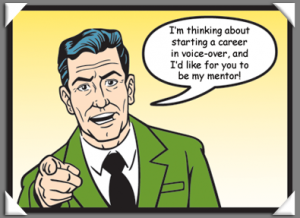This Date in My History — Sunday, 12 January 2003 12:30pm
This morning, I have been wondering “what have I gotten myself into?” I am filled with panic over my audiobook. Casting all of the characters is overwhelming, and the author’s comments have only served to confuse instead of clarify…
Not only am I worried about giving voice to 70 speaking people, I am worried about the actual production. What if the sound quality varies between sessions? How will I get everything done in time, considering that I have a two-month turnaround that puts my due date to be the time I will be in NY? My day job will require a trip the week of Feb. 10 to Ft. Lauderdale, and I hate to think of nights alone in my hotel room of editing this book.
Drew and I talked about it at breakfast, and he reiterated his belief in me that I can do all of this and do it successfully. He promised again to help me in any way possible.
I felt better to come up with an action plan for getting this book done. I realized that if I only work on it (recording/editing) just an hour each night that it would get done in plenty of time.
I have to change my panic into a plan. I will spend this afternoon making casting decisions, and i will do a sound check with several sessions of set-up/take down in between.
This audiobook is a dream come true and just the first of hundreds to follow. I have the talent and skill to do an excellent job on all aspects of the production. I cannot and will not give in to my fears or feelings of being overwhelmed.
Having written all of that, I’d better get started on my plan — I’m burning daylight!
More at 10pm —
I spent about 8 hours (or maybe just 7.5, but still all afternoon) in my room working on character voices for my book. I first listened to the 2nd tape of Pat Fraley’s course on character voices. He described a method of cataloging the voices which I adopted on the book.
After supper, Drew came and listened to me at my request because the process was going slowly for me. I created a database of voice characterizations rather than using individual worksheets like Pat Fraley suggested. I feel more in control of this project with 25 characters in my database and thoughts prepared on a handful of others. I was practicing all afternoon, and am I ever tired!
At some point today, I wondered if I should end my eLance subscription. Is it a sign that I received an invitation to bid tonight on an invite-only project where I was the only person invited? Anyway, I bid on that one and another one tonight; we’ll see what happens.
Today’s Take-aways:
1) When you feel overwhelmed by a task, break it down into small, manageable pieces. Figure out the time required for each piece so that you can meet your deadline.
2) We all need support from others to help us attain our goals. As Barbara Sher says, “isolation is the dream killer”. Barbara notes that sometimes strangers will be less resistant to your ideas and offer you more support than your friends or family. If you are not blessed to have the support of your spouse as I am, reach out to friends or start a meet-up group of other goal-minded people.
3) Always believe in yourself! What you think about your chance of succeeding is perhaps the greatest indicator of your success. To quote Henry Ford: Whether you think you can or you think you can’t — you’re right.


